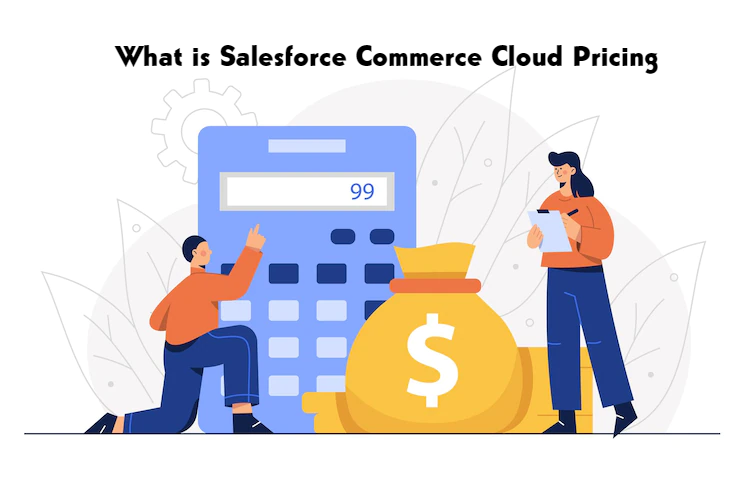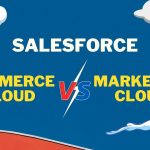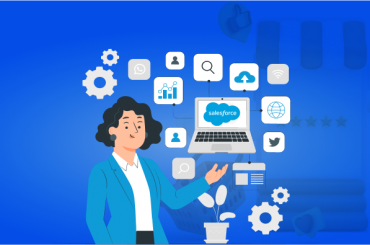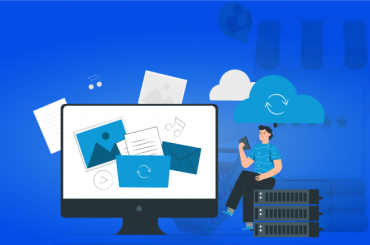What is Salesforce Commerce Cloud Pricing? The Ultimate guide
Last Updated | April 28, 2023
Table of Contents
Online businesses are drawn to the Salesforce Commerce Cloud Pricing structure in a variety of ways. First, unlike Magento and Shopify Plus, Salesforce doesn’t somehow charge upfront licensing fees. Secondly, because price levels are scalable, the amount that merchants pay reflects how well or poorly their business is doing.
Salesforce only wants genuine shop owners who are committed to growing their eCommerce businesses; unlike Shopify, which allows anyone with a few dollars to utilize the platform.
Salesforce Commerce Cloud development is one of several effective e-commerce systems that is frequently used for starting an online business. We will explain the pricing for the Salesforce Commerce Cloud in this blog post and the variables that may affect it.
Questions about scaling commerce? Read this article Salesforce eCommerce integration to have a better understanding of the topic.
What is Salesforce Commerce Cloud?
Salesforce commerce cloud is an integrated, mobile-first unified cloud-based eCommerce platform created as a SaaS solution for businesses. The main goal is to make it possible for customers and retailers to interact on many channels in a seamless way.
Salesforce’s own definition of Commerce Cloud
“Commerce Cloud is the world’s leading B2C and B2B commerce solution. Commerce Cloud is a multi-tenant, cloud-based commerce platform that empowers brands to create intelligent, unified buying experiences across all channels — mobile, social, web, and store.”
Commerce Cloud has developed into another essential and potent service provided by Salesforce over the past few years.
Salesforce B2B Commerce Integration
Although it’s not a norm, Salesforce views C-level professionals as their key clientele. This solution is accessible to everyone with a multichannel business that is expanding.
In order to address the complicated purchasing requirements of the business retailer, Salesforce B2B Commerce Integration is natively built on the Salesforce platform, which links the commerce, CRM, and marketing clouds.
Salesforce B2C Commerce integration
Salesforce certified b2c commerce developer drives customer interaction across all platforms, regions, and digital channels to transform purchasing experiences.
You receive a wide range of capabilities, including merchandising, fulfilment, artificial intelligence, promotions, an open development environment, and mobile-first custom choices that may be further modified.
Read about top Salesforce trends that will help businesses keep up with all the latest Salesforce future developments
Demandware was the previous name for Salesforce Commerce Cloud. It is a consumer-friendly, flawless eCommerce framework designed and constructed with the specific goal of assisting businesses in growing the value of their brands, exploring uncharted business opportunities, increasing sales, and increasing customer conversions in the quickest and most efficient manner.
Every growth-oriented company aiming to give its clients outstanding shopping experiences across several channels should choose this cloud-based commerce platform.
At every point of the customer journey, Salesforce Commerce Cloud development offers a range of capabilities that revolutionize how brands communicate with their audience.
Questions? Ask about Salesforce Commerce Cloud implementation, or anything else. Also, Read this Guide What Is Salesforce Commerce Cloud
Moving from one platform to the other is effortlessly attributable to the Commerce Cloud. Every firm is therefore supported throughout every engagement phase and platform.
Salesforce Commerce Cloud pricing wise is very affordable and is a platform for running online businesses effectively as well as an open and functionality-rich cloud-based eCommerce platform that tries to encourage companies to create clever and engaging purchasing experiences for the customers across all channels, including mobile, web, store, social, etc.
Salesforce Commerce Cloud Rough Cost Of Ownership
-
Salesforce Commerce Cloud Pricing on Average
To establish a Salesforce Commerce Cloud pricing varies factors depending on the options and Gross Merchandise Volume or GMV. SF Commerce Cloud is available for as little as £180k and as much as £1 million. The richness of the components will determine everything.
- The typical price to develop a Salesforce commerce cloud is between £250k and £600k.
When we contrast the platform with Magento, there isn’t much of a price difference.
- In general, Salesforce is appealing due to its built-in technologies, such as Einstein for personalization or Machine Learning, which informs shops about the most popular searches and suggests products from hot categories.
The Salesforce Commerce Cloud integration with the Salesforce Marketing Cloud and Commerce Insights is its strongest feature.
-
Use case Of Salesforce Commerce Cloud Pricing —A Rough Estimates
Here, we’ll use a single store scenario with a £5 million GM, or gross merchandise volume, that’s projected to increase to £20 in three years. Following are a few significant expenses:
- The cost of a 3-year license would rise to £375,000.
- Cost to construct Salesforce Commerce Cloud: £200 to $300,000.
- 18k was spent on ongoing development.
- Any third-party integration fees will be charged separately.
Explore the complete Salesforce 360
-
The Three Tiers Of Salesforce Commerce Cloud Pricing
-
Starter Tier
This tier is ideal for small business owners with just one website or store and two pricing books. One per cent of GMV is payable for this Salesforce Commerce Cloud Pricing category.
-
Growth Tier
With up to five websites or storefronts and ten pricing books, this tier is suitable for mid-sized organizations. One to two per cent of the GMV is charged in this Salesforce Commerce Cloud Pricing tier.
-
Unlimited Tier
Large businesses with intricate features are best suited for this tier. 2 per cent GMV is charged for this Salesforce Commerce Cloud pricing category.
How Does Salesforce Help Small eCommerce Businesses And Companies?
Read: How to Boost Performance Salesforce Commerce Cloud
You should be aware of how your small businesses are constantly doing before receiving the transition plan of how Salesforce can assist. The metrics you should monitor in order to grow your company and gauge your eCommerce success are:
- Calculating the conversion rate.
- Determine how much traffic is coming to your website.
- Average of orders and sales
- The proportion of accepted and rejected orders
- Extensive reports on marketing campaigns
- Cross-platform personalized content
- Predictive analytics and reporting
- Detailed customer base visualization
- Using predictive analysis to influence the consumer experience
- A full-circle perspective of your clients
- Audience division
When you are aware of your company’s performance, it is simpler to identify its strengths and potential areas for growth.
-
A little overview of how Salesforce Commerce Cloud integration is helping businesses of every size with the best Salesforce Commerce Cloud Pricing?
- A consolidated picture of all the data users’ needs.
- simple lead follow-up
- Automate the system for calling, meeting, and email tracking.
- the accurate information from your mailbox
- Work from home or the office, or while travelling.
- Offer a customizable view of the sales information
- Access and update data using the Salesforce mobile app from anywhere at any time.
- Customized exchange.
You might also want to read: Benefits of using eCommerce Site Migration
What is included in Salesforce Commerce Cloud?
-
Digitalized Commerce Cloud
Common tools, smartphone layouts, and other characteristics can help you design a fully responsive website.
You can promote your online marketplace on social networking sites and widen your target market with the aid of Commerce Cloud Digital. In addition to all of this, you may enhance the mobile customer experience by optimizing digital payments and searching, lowering cart abandonment, and developing your own branded app.
-
Pre-Built Architecture
You may quickly create a unique, expert website using this cutting-edge framework. To successfully maintain your website, businesses could use pre-designed schematics, integrated digital innovation tools, and valuable integrations for changes.
-
Cloud’s Endless Aisle
You may combine your shopping channels with Salesforce Commerce Cloud and simplify the purchasing experience for both your consumers and your retail employees.
You may provide your team with corporate and customer databases and data on online inventory, all while offering tailored customer experiences.
Your clients will be able to fill their Wishlist with the things they want thanks to this. By promoting special offers in the online store, you might potentially decrease your walk-in sales.
-
Automated Order Management
You can automate the financial transactions, handle refunds and cancellations, and expedite the process of completing and shipping customers’ orders around the world with Order Management Salesforce Commerce Cloud.
-
Trade Portals
By involving and motivating your consumers through loyalty programs, you may establish a long-lasting relationship with them. You may offer your clients relevant learning resources at each and every point of their purchasing journey since Salesforce Commerce Cloud allows you to track consumer behavior statistics.
Through forums, newsletters, and social networks, you may also provide your customers with pertinent content and brand updates.
-
Business Platform
Without the need for coding knowledge, Salesforce Commerce Cloud provides a variety of themes, development tools, and commerce APIs. Additionally, it is feasible to integrate your business data throughout all digital platforms and obtain platform-specific data-driven insights regarding client experiences.
You might also want to read: Salesforce Merchandising
Final Words
Salesforce has a tendency to engage with businesses extensively because of the GMV or Gross Merchandise Volume model. In weighing the benefits of the Salesforce Commerce Cloud integration, it’s important to keep in mind that, when compared to certain other eCommerce cloud platforms like Magento, there aren’t as many highly skilled agencies or certified Salesforce commerce cloud developers.
Read about How To Go Headless With Salesforce Headless Commerce
Please get in touch if you wish to have a thorough conversation about Salesforce Commerce Cloud pricing or any other part of it with one of Folio3’s, a Salesforce Commerce Cloud Consultants, trained professionals. We have the best of the breed, who focus on the client’s and their business’s needs. They strictly believe in delivering the project on time with the best in quality.
FAQs:
Q1. How much does Salesforce commerce cost?
Salesforce Commerce Cloud costs about $150,000 a year in license fees. The important thing to keep in mind is that these expensive license fees are not necessarily upfront. Retailers are shielded from substantial losses by this.
The Salesforce Commerce Cloud Pricing structure is scaled, so the money you spend reflects how successful your business is doing. if you have a long-term loss or deterioration. You don’t need to be concerned about paying extra fees for Salesforce Commerce Cloud on the platform.
Hosting/server administration, planning and installation, platform protection and servicing, CDN management, evaluation and verification of code quality, platform upgrades, and other services are all included in the license fees for Salesforce Commerce Cloud development.
Q2. What does Salesforce Commerce Cloud do?
Salesforce Commerce Cloud development enables businesses to launch sooner, expand faster, and reach a larger audience. Our technology will help you create new consumer experiences that generate converts and generate brand loyalty by leveraging the benefits of the cloud.
We offer 1-to-1 personalization without the employment of data scientists by incorporating next-generation artificial intelligence into the platform’s basic fabric. From preparation to launch and beyond, our broad technology partner ecosystem and a team of industry professionals assure your success.
Q3. What is the difference between sales cloud and commerce cloud?
In a nutshell, Salesforce Commerce Cloud is a centralized location for producing and delivering E-commerce capabilities, Salesforce Service Cloud is intended for service-related work processes, and Salesforce Sales Cloud is the company’s mainline business technology platform for information, analytics, and lead management, and other revenue functionality.
The types of clients and industry verticals, as well as their needs, are the most significant variations between these three tracks.
Q4. Is Salesforce Commerce Cloud in demand?
Today’s consumers want businesses to offer their items whenever and wherever they want them, and this is changing the buying experience.
With 25% of shopping predicted to take place outside of a retailer’s or brand’s website, app, or storefront by next year, businesses should adapt quickly and embrace innovative channels to give customers more buying versatility.
These new partnerships and innovations combine Salesforce’s platform’s strength and flexibility with an extensive ecosystem, allowing merchants to build fast, interconnected, and uniquely tailored shopping experiences.












